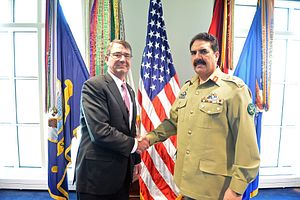The United States Department of Defense has decided to effectively withhold a $300 military reimbursement tranche to Pakistan, citing Islamabad’s inadequate attention to the fight against the deadly Haqqani network. Justifying the decision to withhold reimbursement on account of the Haqqani network is a first by the United States, despite threats along the same lines last summer. Broader military reimbursements were temporarily frozen in 2011, following the bilateral fallout after the U.S. raid against Osama bin Laden’s compound in Abottabad, but resumed later that year.
“The funds could not be released to the Government of Pakistan at this time because the Secretary has not yet certified that Pakistan has taken sufficient action against the Haqqani network,” Pentagon spokesman Adam Stump told reporters on Wednesday. “This decision does not reduce the significance of the sacrifices that the Pakistani military has undertaken over the last two years,” Stump added, intending to lessen the sting of the decision to withhold reimbursement.
Under the current road map for security cooperation between Washington and Islamabad, U.S. military assistance is offered as reimbursements for expenses incurred by Pakistan in its domestic fight against terror groups. The Pakistani military, starting in the summer of 2014, began Operation Zarb-e-Azb, a joint military offensive against a range of militant groups primarily in Pakistan’s border areas with Afghanistan.
Under the Coalition Support Fund (CSF) program, appropriated U.S. funds are intermittently disbursed to Pakistan after the U.S. secretary of defense certifies that Islamabad has been meeting its obligations. U.S. Secretary of Defense Ash Carter has refused to do so this month. Since 2002, the United States has disbursed approximately $14 billion in reimbursements to Pakistan under the CSF.
Concerns have been simmering in the United States—notably in Congress—that Pakistani efforts have not been uniformly targeting all militant groups. Earlier this year, a group of U.S. lawmakers moved to block the use of public U.S. funds to subsidize the sale of F-16 fighter jets to Pakistan, causing a sharp deterioration in ties between the two countries. Senator Bob Corker, the chairman of the U.S. Senate Foreign Relations Committee, at the time expressed concerns that Pakistan had continued to “support the Taliban, the Haqqani Network and give safe havens to al-Qaeda.”
If Carter does not reverse his decision, the $300 million payment won’t go through, delivering another summertime strike to already fragile bilateral ties between the United States and Pakistan. In May, compounding the damage of the F-16 imbroglio, Pakistan strongly protested a U.S. drone strike against the former leader of the Afghan Taliban, Mullah Akhtar Mohammad Mansour.
Pakistan denies distinguishing between terror groups. According to a statement by Nafees Zakaria, a spokesperson for Pakistan’s Foreign Office, “Pakistan does not draw any distinction between any terrorists and we have taken up the fight against terrorism and the terrorist elements within Pakistan.”

































